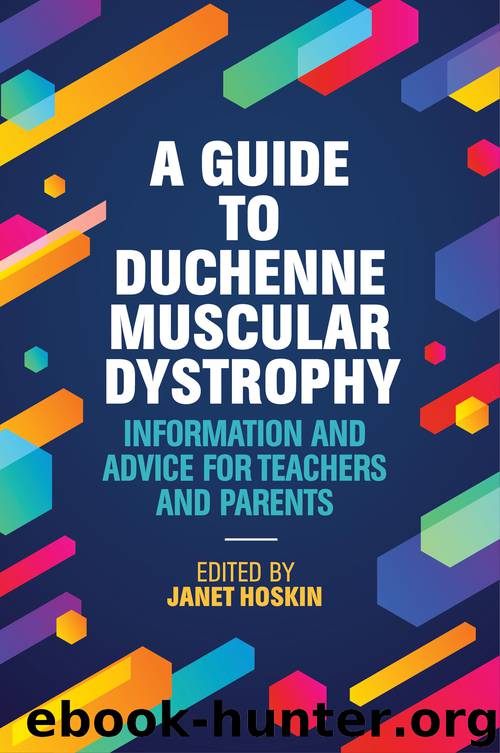A Guide to Duchenne Muscular Dystrophy by Janet Hoskin

Author:Janet Hoskin
Language: eng
Format: epub
ISBN: 9781784504342
Publisher: Jessica Kingsley Publishers
Published: 2017-11-26T05:00:00+00:00
Chapter Six
TALKING TO CHILDREN
ABOUT DUCHENNE
MUSCULAR DYSTROPHY
David Schonfeld
Informing children of their diagnosis and starting the discussion
Generally, the best time to inform children that they have DMD is soon after it first becomes known. Parents’ inclinations may be quite different. They may want to shield their children from learning difficult news about their health. Parents may think it best to wait until children are ‘ready’ to accept the information, or at least until they themselves have come to terms with the diagnosis and its implications. Parents may justify the delay by questioning if their children are even ready yet to understand what it all means. They may decide to wait until the ‘right time’ to tell their children, or at least until a better time. The task may seem so overwhelming that they simply decide to put it off until later.
While it is understandable that parents want their children to believe they are safe and healthy, the reality is that children can tell when parents and other close relatives in their lives are worried or upset. Even if they haven’t been told anything, children sense that something is wrong. Knowing that something is wrong and having no idea what it is can be unsettling even for young children. When parents decide to withhold information from their children, the adults that are aware have to devote a lot of time and energy to maintain secrecy – at a time when they have little of both. It limits the adults’ ability to readily access information and to provide support to each other and of course makes it impossible to provide any such support to the children. Chances are that children will find out inadvertently, such as by overhearing comments (e.g. a nutritionist that comments during a clinic visit the importance of watching the child’s weight gain because otherwise he will be too heavy to lift out of his wheelchair when he gets older). When children only get piecemeal information about their medical condition it’s likely that their understanding will be limited; they may have major gaps in their comprehension and significant misunderstandings (e.g. I ate another cookie when my mum wasn’t looking – will that mean I may not be able to walk in the morning?). Learning about DMD from overhearing a comment or figuring it out on their own is not the best way for children to first learn of their condition.
Misleading children, even when the motivation is entirely well-intentioned, may erode children’s trust and lead to anger and withdrawal. It may communicate to children that their parents are not willing or able to answer questions, provide information, or offer support. The current expectation for children with DMD is eventual progression of illness which requires an increasing dependence on adult caregivers – often the parents. Such dependence should have a firm foundation of trust and mutual respect.
It’s true that very young children can’t easily understand much about DMD – at least not at first. But the only way they will ultimately understand is to be taught and the sooner the process is started, the sooner progress is made.
Download
This site does not store any files on its server. We only index and link to content provided by other sites. Please contact the content providers to delete copyright contents if any and email us, we'll remove relevant links or contents immediately.
| Administration & Medicine Economics | Allied Health Professions |
| Basic Sciences | Dentistry |
| History | Medical Informatics |
| Medicine | Nursing |
| Pharmacology | Psychology |
| Research | Veterinary Medicine |
Good by S. Walden(3548)
The Social Psychology of Inequality by Unknown(3018)
The Checklist Manifesto by Atul Gawande(2844)
0041152001443424520 .pdf by Unknown(2843)
Get What's Yours for Medicare: Maximize Your Coverage, Minimize Your Costs by Philip Moeller(2620)
The Meaning of the Library by unknow(2564)
Guns, Germs and Steel by Diamond Jared(2365)
Borders by unknow(2301)
23:27 by H. L. Roberts(2245)
And the Band Played On by Randy Shilts(2197)
Being Mortal: Medicine and What Matters in the End by Atul Gawande(2106)
A Leg to Stand On by Oliver Sacks(2033)
The Hot Zone by Richard Preston(2013)
More Than Words (Sweet Lady Kisses) by Helen West(1853)
The Valachi Papers by Peter Maas(1846)
The Laws of Medicine by Siddhartha Mukherjee(1797)
The Andromeda Strain by Michael Crichton(1742)
Get What's Yours for Medicare by Philip Moeller(1676)
The Obesity Epidemic by Robyn Toomath(1673)
